- Home
- Annie Proulx
Bad Dirt Page 4
Bad Dirt Read online
Page 4
“They are sort of numbered,” said Linny. “How much is IIC? I hate those old Roman numerals. How did they ever multiply or divide?”
“Who knows?” said Georgina, who had dropped out of school early and to whom “Latin” meant Tito Puente and margaritas.
Georgina wanted to stay and watch Linny, tell her what to do, but throttled the urge to control.
“O.K.,” she said. “I’ll leave you to it.”
Late that afternoon the old Land Rover rolled in. Charlie Parrott was just closing the tack room door and looked over at his daughter.
“What the hell you been doin?” he said. “Christ, look at you.” The girl was streaked with sweat-runneled dirt and dust. Her damp hair straggled. There were cuts on her arms, and she sneezed.
“Dust.” She wept. “Cleanin up the old Brawls files for Georgina. That fuckin buildin’s got more dust and rat turds in it and dead moths and mice glued onto the floor than Nevada’s got sand.”
“She payin you?”
“You bet. Good pay, but a stinkin job.”
“She didn’t say nothing ame about it.” He moved his jaw from side to side, pushed up on his glasses. “What’s them cuts on your arms? Look like hunderd and elevens.”
“From those old file folders. They’re all dried out and sharp on the edges. What’s hundred and elevens?”
“Old-timers used a call the spur marks on a hard-rode horse ‘hunderd and elevens.’” He drew the marks/// in the dust to illustrate. “Well, hell, why not bring the vacuum cleaner down there and get rid a that dirt? If you’re goin a do this? Simple enough.”
“No electricity. Buildin’s dead. They’re gettin ready a tear it down. Pretty soon.”
“Baby girl, they invented a thing called a generator. Tomorrow mornin I’ll come down and set up a genny for you. Get that dust out anyway. We’ll take the Shop-Vac, not upset the household arrangements. What all is down there anyhow?”
“Dad, those old Brawlses never threw a thing away. It is letters of all kinds to about ever person in the world, court stuff, law books. Hard a know where to begin. Mr. Gay Brawls. What a name!”
“It didn’t use to mean what it means now. Plenty were named Gay. Even in Nevada. Was old Gay Pitch had a gas station in Winnemucca. Nobody thought nothin about it and he raised a railroad car a kids. So, O.K., tomorrow morning I’ll drop in.”
Whatever it was, they were in it together.
The next day they spent the forenoon vacuuming and cleaning. Charlie Parrott lugged several pails of water up the stairs and sloshed them over the floor to lay the dust. It was another day before Linny got at the closet where Gay G. Brawls’ working life was stored.
Georgina had seen Charlie loading the generator into the truck and, when he said he had to go to town, immediately guessed its purpose. She telephoned Decker Mell.
“He’s takin the generator down to town. Bet you he is goin a clean up all the dust in that building for her. She come home yesterday some mess a dirt.”
“That seems kind a sensible,” said Decker. “What’s the problem?”
“Oh, no problem yet, but he didn’tsay nothin about it to me. You’d think he’d a mentioned it. He babies that girl too much.”
But that night at dinner Charlie remarked in his offhand way that he had cleaned up the dust for Linny and that she was ripping through the old papers with a sense of determination that amazed him.
“She’s a good kid,” he said, and the parent and daughter smiled at each other.
“You ought a told me she was doin this job,” he said in an offhand way to Georgina, who did not reply but cut savagely at the meat on her plate.
Linny opened another of Gay G. Brawls’ boxes. Inside she found a sheaf of letters, many from someone who signed himself “Bill,” and at the bottom of the box, half a dozen cans of film marked with Roman numerals. What, she wondered, was the appeal of Roman numerals to those old dead lawyers? She read several letters, one dated October 1913 from “Wounded Knee Battlefield.” The writer, whose name she could not make out, had a spiky black hand, and addressed lawyer Brawls as “Gay.”
We left Chicago 13 days ago and are here to reproduce the battle of Wounded Knee for the moving picture machine. It is Col. Cody’s big project and he has high hopes that it will relieve himof debt. I am a little concerned about this as Messers. Bonfils and Tammen are backing the affair which will be filmed and produced by Essanay—the Chicago film company—and the Colonel seems only to fall behind in these partnerships. We must hope for the best. He will do other battles—Summit Springs, the Mission, last stand of the Cheyennes, etc. We are surrounded by Indians and their teepees and the soldiers of the 7th Cav. from Fort Robinson. The Indians are always here with an interpreter powwowing about the rations they are to get or the acting pay or something or other. It’s been really cold.
Another letter, in the same handwriting:
General Miles, who is the advisor, is very fussy about accuracy, insisted that as there were 11,000 U.S. troops under his command back then, that many must be shown. It was amusing that while Col. Cody agreed to this, the same 300 troops marched around and around until 11,000 were shown! The moving picture machine had no film in it!
There was a yellowed newspaper clipping, so dry and weak the edges crumbled when she touched it. She laid it on a chair and read the remaining portions of a rave review headlined: “Great Audience Held in Tense Wonder by Indian War Pictures.”
The reviewer wrote that the pictures were “very wonderful in their realism. It is quite impossible to describe them. They are something we can never see again.” On and on the review went, conjuring flying snow, the barking of the machine guns, dying Indians, drifting smoke. Finally, wrote the deeply moved reporter,
…we were recalled to the fact that we were sitting in the Tabor Opera house looking at the moving picture reproduction of the last fight of the Indians of North America against the army of theUnited States. Hillsides, the plains, the moving troops, the dying Indians, the coughing Hotchkiss were no more. Instead there were the lights of the theatre and the white screen and a thousand people awaking to the realization of having witnessed the most wonderful spectacle ever produced since moving pictures were invented…. Nothing like this has ever been done before. Nothing to equal it will perhaps, ever be done again.
Linny sighed and carefully laid the fragile paper in a folder. She picked up one of the film canisters. “War Bonnet #II,” read the faded label. Roman numerals again. “Rebellion/Reel No. I” was another. There were five Rebellion canisters. But what rebellion? She had only a hazy idea of the Indian wars. Perhaps she would go to the library. She knew better than to open any film canisters.
That evening, watching the news, when Georgina left the room to go to the bathroom, she said to Charlie Parrott, “I found somethin todaymight be interestin.”
“What?”
“Cans a film. Letters from Buffalo Bill. Seems like he was makin a movie of the Indians and the U.S. Army fights. I guess maybe that’s the film in those cans.”
“Yeah? First I heard about a movie like that.”
“It was way back in 1913 he made it. I got a check it out at the library, see what I can find out. Might be valuable.”
“The letters probly worth somethin. What’d they say?” He turned the television sound off.
“Just legal stuff, stuff about debts and payments and some letters about the film, about them being in some place called Wounded Knee. Weird name. In South Dakota?”
Charlie Parrott snapped his head up. “Wounded Knee! My God, did that old fraud have anything to do with Wounded Knee?”
“I guess so. What about it? What was Wounded Knee, anyway?”
But Georgina came into the room and made a face at their conversation, turned the television sound back on.
“I’ll tell you tomorrow. It’s a long story.”
“What’s a long story?” asked Georgina.
“Indian history,” said Charlie Parrott. “A long, sad story that make
s you want a puke.”
Charlie spent the next day sorting out the neighboring ranch’s cattle that had found a weak section of fence and breached it. When he got back at dusk, dirty and tired, Linny and Georgina had eaten and cleared the table. There was a place for him set in the kitchen.
“Georgina said keep your supper warm,” said Doreen. “But it ain’t the kind a supper that keeps good. Kind a dried out,” she said, taking a plate of steak and baked potato out of the oven. The potato had the feel of a deflated football, though smaller. The steak had curled up on the edges and showed the reticulate grain of an osprey’s leg.
Doreen talked on. “And Georgina went up to some polo meetin in Sheridan. Said she might stay over. Said she would call you around ten.” He nodded. He preferred she stay over than drive at night, when all the raging drunks were on the highway looking for something to hit.
“Anyway,” said Doreen, “I’m out a here.”
Linny came in, dressed in her bar clothes—short skirt, peewee boots, and a tiny halter.
“I was goin a tell you about Indian stuff?” he said. It was the ideal time with Georgina out and the long evening stretching ahead.
“Don’t bother,” she said. “I went to the library and got a stack a books.” She gestured at the counter where several books lay. He could see the library call numbers. “I’m just goin downtown for a hour. I’ll start readin when I get back.”
After she left he looked at the books. The top one was Dee Brown’sBury My Heart at Wounded Knee. “She won’t read that one easy,” he said to himself, remembering his own heart-bruising time with the book years earlier.
He was surprised to hear the old Land Rover roar in a little after ten, while he was still on the telephone with Georgina telling her about chasing down Chummy King’s cows.
“I hear Linny’s truck,” he said. “Better hang up. See you tomorrow noon then? O.K., love you, honey. Drive careful.”
“You want a talk?” he called to Linny, hearing the screen door squeak.
“Yeah, but first I want a read the books and get the background. Then I will know what questions to ask. O.K.?”
“Well,” he said. “That makes sense.” But he felt a twist of disappointment. His thoughts on the subject had surfaced, his mind like a tongue probing an infected tooth. He wanted to get into the nickel misery of those crushed ancestors, measure his schizoid self against the submerged past.
“You let me know when.”
“You bet,” she said and pounded up the stairs with the books.
The next morning in the kitchen her face was swollen, both eyes red slits.
“Up all night?”
“Just about.” Her voice was rough and cold. She poured a cup of coffee. He asked no more questions.
It was almost a week before they talked. The days had gone by, Linny down in the old building sorting papers and making lists, but at night, instead of heading for the bars she stayed in her room. Georgina said it was a sign the girl was settling down. Charlie thought she was reading the bitter books. On Thursday, Georgina said she had to go up to Sheridan again. There was an important match, some South American polo players of note, a gala dinner.
“I’ll stay over with Nora Bible,” she said, naming a ranch wife who ran the refreshment tables at all the polo events. “Not so many people bring their picnic baskets like in the old days when it was tailgate city. Don’t one a you want a come up for the match? Charlie, you haven’t seen one for a year, anyway. Be nice. And, Linny, I bet you never even been to a polo match.”
“Oh, I got too many things goin on right here,” said Charlie. “Take some snaps for me and tell me about it.”
Linny shook her head at Georgina and went upstairs.
The cans of film stood in a row on the dresser. She knew a great deal now about what they might show—an Indian dragging a soldier from a horse, some fake hand-to-hand fighting, Indians poking two white captive women with a stick, the Gatling and Hotchkiss guns spraying, and everywhere Buffalo Bill peering into the distance, riding at the front, his white showman’s goatee wriggling in the wind like an albino eel. She did not open any of the cans. She knew also that nothing in the film could possibly equal the tragic power of the single still photograph of Big Foot wrapped in rags lying dead on his back in the snow, his long frozen arms half-raised as if to ward off the bullets, his open ice-glazed eyes fixed forever on anyone who cared to look at him.
Charlie and Linny rinsed the dishes and arranged them in the dishwasher. Charlie never went near the machine without thinking of his mother sloshing chipped plates in an old grey enamel dishpan.
“Dad, can we talk about the Indian stuff now?” She rubbed furiously at the clean counter with a sponge.
“The Indian stuff,” he said.
“Yeah. We’re Sioux, you always told me, but I don’t know what kind a Sioux, and you always said you were born on a rez, but what rez?”
“Oglala Sioux, and I was born at Wazi Ahanhan, Pine Ridge, next a Rosebud. That’s where they pushed old Red Cloud’s people after they got them out a the Powder River country. That Powder River country was the last a the old, old ways. Red Cloud ought a see it now, all full a methane gas pads and roads.”
“So Red Cloud could be a relation? I mean, we could be connected to him, right?”
“We might be.”
“Then what are we doin here with this—with Georgina?” She waved at the dishwasher, the poppies in a blue vase on the kitchen table. “Why aren’t we with our own people? Don’t I got cousins and grandparents and all?”
He’d known these questions would be coming, but the answers were still floating around in the blue sky.
“Linny, I’m sorry, baby girl—I been de-Indianized. I been out workin in the wide world since I was fourteen. The rez didn’t have anything for me. And I never kept in touch with any a them.” But even as he spoke it was as though he were a tall kettle boiling away and his daughter had just raised the lid. The steam rushed forth. Linny stood there, rigid, brimming with anguish and the sense of isolation that she had breathed in from the books all the week long.
“I bet you never been on a rez, have you?” he said. She shook her head.
“There’s more to it than deciding whether you want a live on the rez or in the world. Remember that Indians did not invent the rez. They were the white man’s prisons to get the Indians off the good land. Linny, there’s no virtue in choosin the rez. You can lock yourself into a corner with no way out.”
The girl made an impatient face, little more than a twist of the lips but discounting all he was saying.
He knew it was hopeless but went on. “I’m guessin you want a do the whole thing, don’t you—sweat lodge, beaded moccasins, get yourself a pretty Indian name, find a good-lookin Indian stud, and get into the rez life? I see that brain goin a million miles a hour. Just so you know, I had those same feelins long ago. I went back, met your mother, got you started, and so forth. Romance. To me, now, the romance is wherever you find it, but not very likely on a rez.”
“Why didn’t you guys give me a Indian name?”
“We did.” He smiled. “Little Bedbug.”
“Dad! Goddammit, I’ll pick my own name. Something nice. Like Red Deer or Jade Blossom.”
“You got your cultures mixed up.”
“Well, what’s your name? They didn’t name you Charlie, did they?”
“Yeah, they did. They saw how the world was, so they named me Charlie. I suppose you want me to go around bein called Stands Lookin Sideways or Big Dick?”

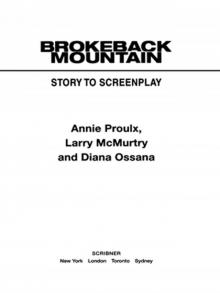 Brokeback Mountain
Brokeback Mountain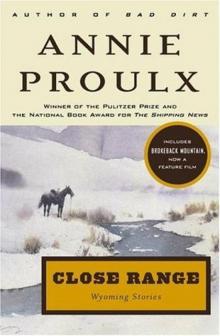 Close Range
Close Range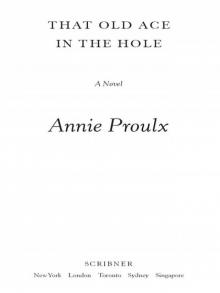 That Old Ace in the Hole
That Old Ace in the Hole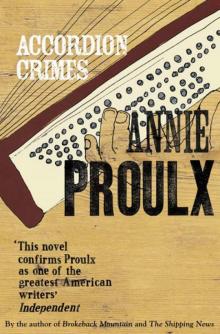 Accordion Crimes
Accordion Crimes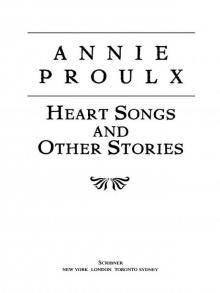 Heart Songs and Other Stories
Heart Songs and Other Stories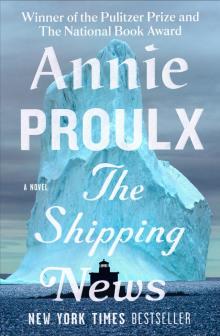 The Shipping News
The Shipping News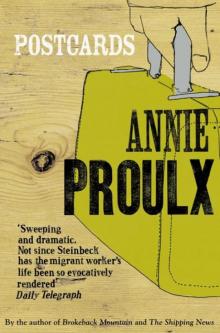 Postcards
Postcards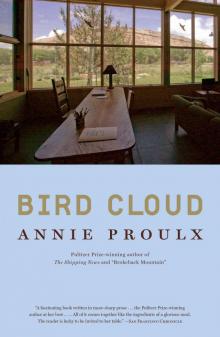 Bird Cloud
Bird Cloud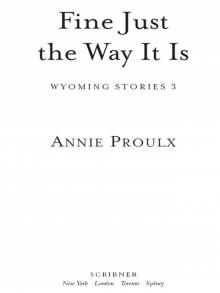 Fine Just the Way It Is
Fine Just the Way It Is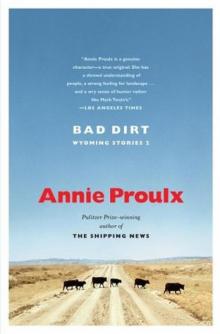 Bad Dirt
Bad Dirt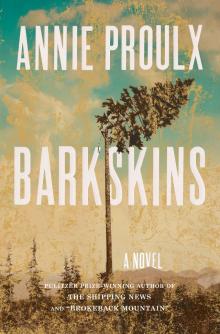 Barkskins
Barkskins BrokebackMountain
BrokebackMountain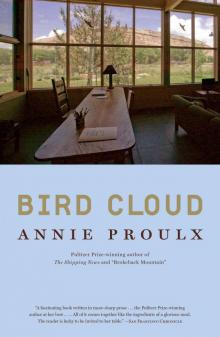 Bird Cloud: A Memoir of Place
Bird Cloud: A Memoir of Place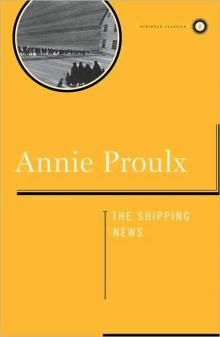 Shipping News_A Novel
Shipping News_A Novel